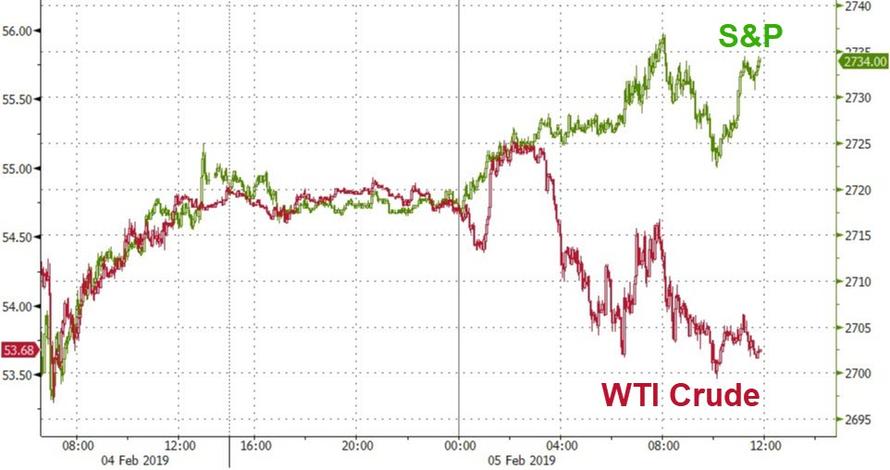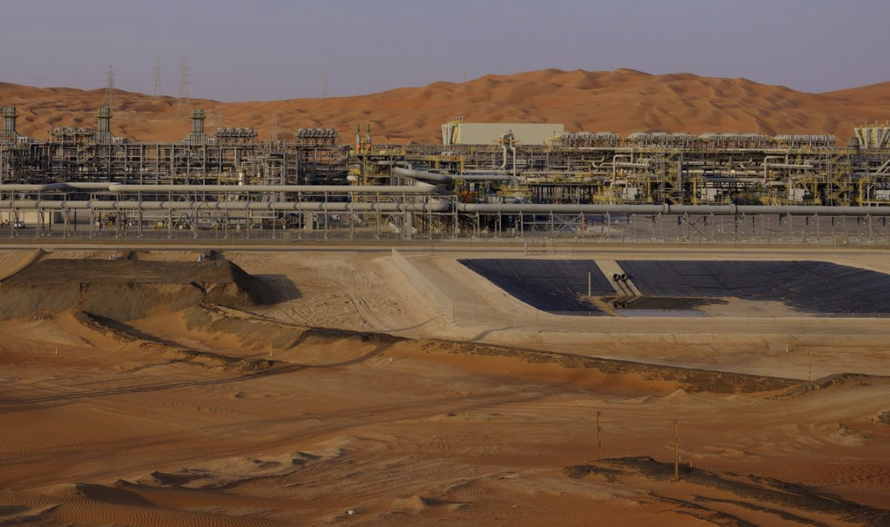OPEC Proposes Formal Oil-Production Alliance With Russia
Even as the US brought sanctions against Venezuela's state-run oil company, oil prices have slumped over the past week, erasing some of a January rebound that saw crude prices rebound alongside equities. But oil bulls who worried that Saudi Arabia and Russia's tandem production cuts wouldn't be enough to finally wedge a floor under crude prices can relax: Because if a plan reported Tuesday by the Wall Street Journal pans out, OPEC might recover the price-setting power it is in fear of ceding to the US as the shale boom continues to...well...boom.

With the US having cemented its new position as the biggest oil producer in the world thanks to shale, and President Trump exerting pressure on Saudi Arabia to drive oil prices lower, WSJ reports that Saudi Arabia and its Gulf allies in OPEC have proposed a formal alliance with a 10-nation group of petroleum producers led by Russia - and alliance that would "transform the cartel" (which has recently suffered speculation that it has lost its relevance after Qatar announced its plans to leave the bloc).

However, Iran and some of its allies within the cartel have opposed the tighter partnership, fearing it could lead to Saudi Arabia and Russia dominating the organization.
The proposal would formalize the loose union between members of the Organization of the Petroleum Exporting Countries and the group led by Moscow, which includes some former Soviet republics and other countries. The two groups have increasingly worked together in recent years, including in December when they agreed on a deal to curb production.
Iran and other producers have opposed a tighter partnership, fearing it could be dominated by Saudi Arabia and Russia, according to officials in the cartel. Riyadh and Moscow are the world’s top two oil exporters. A Russian energy ministry spokeswoman didn’t respond to a request for comment.
Given that Saudi needs oil back at $80 a barrel to balance its national budget, the alliance would likely be geared toward Saudi and Russia achieving the goal of higher prices. To achieve higher prices, they need more leverage against the US.
To be sure, it's not like this level of collusion between OPEC and non-OPEC producers would be unprecedented. The two groups have been increasingly working together in recent years. As recently as December, the 14-member OPEC and the 10-member bloc led by Russia struck a deal to cut production in a bid to lift prices after global oil prices shed more than one-third of their value during the month of October.
According to a proposal detailed by WSJ, once formalized, the deal - which would function like a non-legally-binding, informal arrangement, wouldn't be all that different than the process that led to the December agreement.
In December, the 14-strong OPEC and 10 allies led by Russia reached a new agreement to tackle an oversupplied global crude market by cutting production by a combined 1.2 million barrels a day.
At the time, the groups put off a final decision on the nature of their future cooperation. The groups first collaborated in late 2016 to help oil prices to rebound after a two-year crash. It was Russia’s first solid alliance with the cartel in decades.
Under the proposal, OPEC would continue regular meetings to agree on production and monitor implementation with the Russia-led group, according to OPEC officials. Under the current draft document, the alliance could last up to three years and wouldn’t be legally binding, one of the OPEC officials said.
Participants still need to iron out differences, said another OPEC official. The first cartel official said all sides were likely to end up agreeing on some arrangement as oil prices could crash without a deal.
Still, a more formalized - but still not legally binding - pact faces some hurdles from wary members of OPEC, because some members of the new pact would need to run the issue by their Parliaments. And Iran wants any relationship with producers outside of OPEC to remain as loose as possible. Ideally, Tehran would want the expanded group to meet as infrequently as possible - only when a market crisis requires it - and it would also like all OPEC and non-OPEC members to attend the same meeting. Oman, meanwhile, would like to limit the number of meetings with the non-OPEC members.
Suhail Al Mazrouei, the UAE energy minister, reportedly said that a long-term pact still faces hurdles (though the current plan would call for the alliance to last three years).
Notably, the plan is a compromise between the status quo and a Saudi and Russia-led proposal that called for the creation of an entirely new bloc which would have been de facto controlled by the Kingdom and Russia, which would have been granted full membership.
The latest proposal is a compromise of earlier plans floated by the Saudis and Emiratis. Under its own proposal, Saudi Arabia advocated the creation of a completely new organization integrating Russia as a full member. In June, Crown Prince Mohammed Bin Salman, through his oil minister Khalid al-Falih, proposed a new Vienna-based cartel, according to OPEC officials.
The structure would have ended OPEC’s current United Nations-style, egalitarian system, in which each member has the same power to vote on decisions regardless of the size of its production. Instead, the new organization would have bestowed outsize power on Saudi Arabia and Russia.
The Saudi proposal irked OPEC members Iran, Iraq, Nigeria, Angola and Algeria. At the meeting in December, Iraq’s oil minister, Thamir Ghadhban, reminded Mr. Falih that OPEC had been founded in Baghdad—a pointed criticism of the plan. At the gathering, the Saudi minister said he had no plan to create a new organization.
After receiving the Saudi proposal, Russia’s energy minister, Alexander Novak, told OPEC the decision is outside his control and escalated its study to foreign minister Sergei Lavrov and the Kremlin, the OPEC officials said. In late December, Moscow officially rejected the Saudi proposal.
"There will be no formal organization like OPEC," Russian state TV RT quoted Mr. Novak as saying on Dec. 29. He cited the prospect of additional bureaucracy and antitrust risks for the decision.
OPEC members and Russia are expected to debate the proposal in Vienna during a meeting during the week of Feb 18. If OPEC and its sometimes fractious members decide to give it a shot in the name of pushing back against Trump, expect to see oil prices retrace their Q4 drop.



